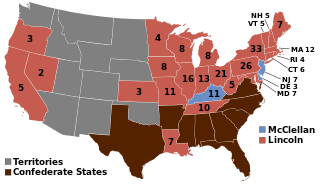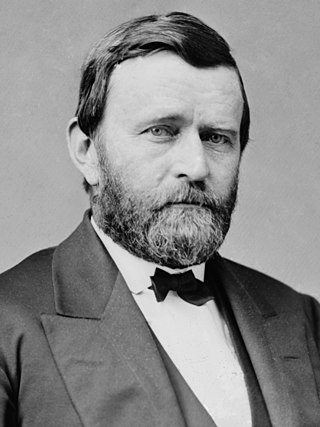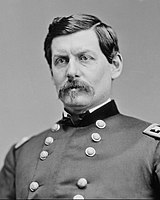
The 1876 United States presidential election was the 23rd quadrennial presidential election, held on Tuesday, November 7, 1876. Incumbent Republican president Ulysses S. Grant declined to run for a third term, so the party chose Rutherford B. Hayes, the governor of Ohio, as its nominee. The Democratic Party nominated New York governor Samuel J. Tilden as their nominee. It was one of the most contentious presidential elections in American history. Its resolution involved negotiations between the Republicans and Democrats, resulting in the Compromise of 1877, and on March 2, 1877, the counting of electoral votes by the House and Senate occurred, confirming Hayes as president. It was the second of five U.S. presidential elections in which the winner did not win a plurality of the national popular vote. This is the first time it happened since 1824, and the only time that a candidate won an overall majority in the popular vote but did not win the presidency.

The 1860 United States presidential election was the 19th quadrennial presidential election, held on Tuesday, November 6, 1860. In a four-way contest, the Republican Party ticket of Abraham Lincoln and Hannibal Hamlin won a national popular plurality, a popular majority in the North where states already had abolished slavery, and a national electoral majority comprising only Northern electoral votes. Lincoln's election thus served as the main catalyst of the states that would become the Confederacy seceding from the Union. This marked the first time that a Republican was elected president. It was also the first presidential election in which both major party candidates were registered in the same home state; the others have been in 1904, 1920, 1940, 1944, and 2016.

The 1864 United States presidential election was the 20th quadrennial presidential election. It was held on Tuesday, November 8, 1864. Near the end of the American Civil War, incumbent President Abraham Lincoln of the National Union Party easily defeated the Democratic nominee, former General George B. McClellan, by a wide margin of 212–21 in the electoral college, with 55% of the popular vote. For the election, the Republican Party and some Democrats created the National Union Party, especially to attract War Democrats.

The 1868 United States presidential election was the 21st quadrennial presidential election, held on Tuesday, November 3, 1868. In the first election of the Reconstruction Era, Republican nominee Ulysses S. Grant defeated Horatio Seymour of the Democratic Party. It was the first presidential election to take place after the conclusion of the American Civil War and the abolition of slavery. It was the first election in which African Americans could vote in the reconstructed Southern states, in accordance with the First Reconstruction Act.

The 1872 United States presidential election was the 22nd quadrennial presidential election, held on Tuesday, November 5, 1872. Despite a split in the Republican Party, incumbent President Ulysses S. Grant defeated Democratic-endorsed Liberal Republican nominee Horace Greeley.

The Solid South or the Southern bloc was the electoral voting bloc of the states of the Southern United States for issues that were regarded as particularly important to the interests of Democrats in those states. The Southern bloc existed between the end of the Reconstruction era in 1877 and the passage of the Civil Rights Act of 1964. During this period, the Democratic Party overwhelmingly controlled southern state legislatures, and most local, state and federal officeholders in the South were Democrats. During the late 1800s and early 1900s, Southern Democrats disenfranchised blacks in all Southern states, along with a few non-Southern states doing the same as well. This resulted essentially in a one-party system, in which a candidate's victory in Democratic primary elections was tantamount to election to the office itself. White primaries were another means that the Democrats used to consolidate their political power, excluding blacks from voting in primaries.

The 2004 United States presidential election in Indiana took place on November 2, 2004, and was part of the 2004 United States presidential election. Voters chose 11 representatives, or electors to the Electoral College, who voted for president and vice president.

The 2008 United States presidential election in Tennessee took place on November 4, 2008, and was part of the 2008 United States presidential election. Voters chose 11 representatives, or electors to the Electoral College, who voted for president and vice president.

The 1864 United States elections were held on November 8, 1864. National Union President Abraham Lincoln was elected to a second term, while the Republicans added to their majorities in Congress. The elections were held during the American Civil War. Lincoln would be assassinated shortly into his second term.

The 1872 United States presidential election in Texas was held on November 5, 1872, as part of the 1872 United States presidential election. State voters chose eight electors to represent the state in the Electoral College, which chose the president and vice president.

Following is a table of United States presidential elections in Louisiana, ordered by year. Since its admission to statehood in 1812, Louisiana has participated in every U.S. presidential election except the election of 1864, during the American Civil War. At that time, Louisiana was controlled by the Union and held elections, but electors were not ultimately counted.

Following is a table of United States presidential elections in Tennessee, ordered by year. Since its admission to statehood in 1796, Tennessee has participated in every U.S. presidential election except the election of 1864, during the American Civil War. At that time, Tennessee was controlled by the Union and held elections, but electors were not ultimately counted.

The 1860 United States presidential election in Louisiana took place on November 6, 1860, as part of the 1860 United States presidential election. Louisiana voters chose six representatives, or electors, to the Electoral College, who voted for president and vice president.

The 1956 United States presidential election in Alabama took place on November 6, 1956, as part of the 1956 United States presidential election. Alabama voters chose eleven representatives, or electors, to the Electoral College, who voted for president and vice president. In Alabama, voters voted for electors individually instead of as a slate, as in the other states.

The 1948 United States presidential election in Tennessee took place on November 2, 1948, as part of the 1948 United States presidential election. Tennessee voters chose 12 representatives, or electors, to the Electoral College, who voted for president and vice president.

The 1864 United States presidential election in Kansas took place on November 8, 1864, as part of the 1864 United States presidential election. Kansas voters chose three representatives, or electors, to the Electoral College, who voted for president and vice president.

The 1864 United States presidential election in Nevada took place on November 8, 1864, as part of the 1864 United States presidential election. Nevada voters chose three electors of the Electoral College, two of whom voted for president and vice president.

The 1864 United States presidential election in Louisiana took place on November 8, 1864, as part of the 1864 United States presidential election.




















